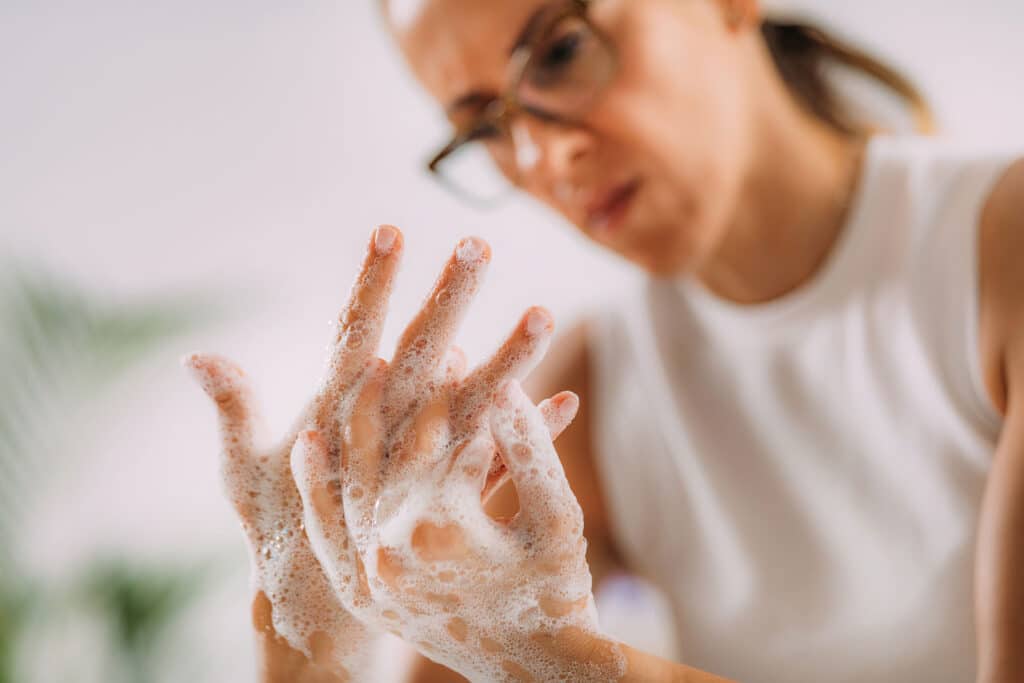Obsessions and compulsions can consume so much time and energy that they interfere with daily life, exacerbating stress and anxiety. This overwhelming cycle can lead some individuals to turn to alcohol use or drug use as a way to cope with their distress.
While OCD compulsions may resemble addictions in some ways, they are distinct conditions. Addiction often involves drug abuse or substance use despite harmful consequences. Those struggling with addiction may develop cravings for substances and find it difficult to stop without experiencing withdrawal symptoms. Over time, this can lead to neglected responsibilities and strained relationships.
The exhausting nature of managing obsessive thoughts and behaviors can drive people toward substances to find relief. Unfortunately, the negative effects of substance use often outweigh the temporary escape it provides, perpetuating unhealthy behaviors. Treating OCD and addiction simultaneously through specialized care offers hope for recovery and long-term well-being.

Table of Contents
The Link Between OCD and Addiction
Addiction is common among individuals with severe mental health conditions like OCD. Both conditions often involve repetitive actions aimed at alleviating intrusive thoughts or unwanted thoughts that cause significant distress.
When OCD leads to heightened anxiety or depression, sufferers may turn to drugs or alcohol as a form of self-medication to temporarily ease their symptoms. Although this might provide short-term relief, it often becomes a time-consuming coping mechanism that can spiral into addiction over time. Addressing both OCD and addiction simultaneously is key to achieving long-term recovery.
There are several reasons OCD and addiction may co-occur. These include:
Trauma
Many people who have OCD and addiction experienced a stressful or traumatic life event before they developed the disorder.
Self-Medication
People who “self-medicate” use substances or behaviors to get temporary relief from their symptoms.
Changes in Brain Chemistry
Some addictive substances can cause chemical imbalances in the brain and worsen mental health.
Shame and Isolation
People who struggle with OCD may abuse substances to deal with difficult social situations.
Genetics
People with immediate family members who have OCD and addiction often share some inherited susceptibility to similar disorders.
Most experts accept that people can experience OCD and addiction at the same time. A study available in the journal Addiction says that about 25% of people who suffer from OCD develop a substance use disorder (SUD) in their lifetime. Some experts believe that the compulsive and addictive behaviors these people exhibit relate to impulsivity. This condition involves acting “on impulse” and following urges despite their better judgment. Another 2022 study found that people with OCD and addictions were much more impulsive than people without these disorders.

Treating OCD and Addiction Simultaneously
OCD and addiction have their roots in compulsion. These disorders can reinforce each other. Treating the disorders simultaneously often results in improved outcomes because it breaks the cycle of triggering unhealthy behaviors. Tailoring treatment to a person’s specific symptoms and circumstances is the best way to achieve lasting, positive results.
OCD and addiction can respond well to evidence-based therapies that address automatic thoughts, help patients understand what drives their behavior, and develop self-control and emotional resilience. Helpful therapies include:
Cognitive-Behavioral Therapy (CBT)
Cognitive-behavioral therapy (CBT) is an evidence-based treatment that can often mitigate drug addiction and OCD. During therapy, patients discover and challenge the thoughts and behaviors that contribute to their compulsions. They also learn coping strategies that can help them avoid substance use when they experience distress.
Exposure and Response Prevention Therapy (ERP)
Exposure and response prevention therapy (ERP) treats obsessive-compulsive disorder (OCD) and other conditions by helping patients understand their obsessions, learn to manage the distress and uncertainty they cause, and ultimately control their compulsions. It gradually exposes patients to triggering situations in a safe environment while teaching them to resist acting on their compulsions.
Medication-Assisted Treatment (MAT)
People who suffer from OCD and an opiate or alcohol addiction may benefit from medication-assisted treatment (MAT) that uses medication and behavioral therapy to help people adjust to life without drugs. Medicines for opiate and alcohol addiction help reduce cravings and withdrawal symptoms or make these drugs unpleasant to use, while medicines for OCD can help relieve compulsive symptoms. A doctor must prescribe these medications and monitor their use to ensure they are safe and effective. Combining medication with behavioral therapy tends to reduce the chance of relapse and improve treatment outcomes.
OCD and addiction can be treated and managed with the right care. Although people may never completely overcome their compulsions, they can find real relief from their symptoms and live more fulfilling lives. Integrated treatment programs that offer inpatient or outpatient rehab, medication, therapy, and group support can tailor their offerings to address both OCD and addiction. These programs often include a variety of therapeutic approaches to prevent relapse and support recovery.
Treatment for OCD and Addiction at Recreate Life Counseling
When a person who suffers from addiction also shows signs of OCD, they often receive a dual diagnosis for a co-occurring disorder. Dual-diagnosis addiction treatment at Recreate Life Counseling addresses substance abuse and OCD simultaneously with comprehensive care.
Our therapists know that OCD and addiction can worsen each other when people experience them together. Drugs can alter the brain, erode mental health, and diminish quality of life. Treating co-occurring conditions can be challenging, and specialized evidence-based therapies are essential for healing.
Dual diagnosis involves personalizing integrated treatments to meet each patient’s needs. Focusing only on OCD or addiction can lead to an incomplete recovery or relapse, so patients work with a team of professionals to understand how their disorders affect each other. Together, patients and their doctors cooperate to find the right treatments and ensure that all medications in the plan are compatible.
All treatment for OCD and addiction should address the underlying causes of compulsive behavior. Therapists should recognize that OCD and addiction can influence each other. They should also consider the physical, mental, and social aspects of these conditions when they are working with patients. Any holistic approach to treatment should address the underlying causes of compulsions and motivate people to heal. As providers learn about their patient’s struggles, patients can gain self-awareness and learn about their condition. Through therapy, patients will learn to make better, more informed choices moving forward.
Benefits of Dual-Diagnosis Treatment
Dual diagnosis treatment offers a holistic approach to recovery that reduces anxiety and improves overall well-being. Managing obsessive-compulsive disorder (OCD) and addiction requires patients to acquire practical coping strategies such as mindfulness, healthy living, constructive thinking, relaxation, and avoiding high-risk situations. Patients use these methods to deal with triggers and cravings effectively.
Many of the techniques listed below are useful for addressing both addiction and OCD compulsions.
Mindfulness Practices
Mindfulness practices can help patients manage OCD triggers by cultivating non-judgmental attitudes and present-moment awareness so that people can disentangle themselves from their thoughts, emotions, and bodily sensations.
Healthy Daily Routines
Establishing healthy daily routines can create structure and predictability for people who suffer from OCD addiction. Reducing uncertainty can make triggers and challenges easier to manage.
Challenging Cognitive Distortions with Constructive Thinking
Challenging distorted, irrational, and inaccurate thought patterns that contribute to OCD compulsions is an essential part of managing the disorder.
Relaxation
Relaxation techniques can help patients reduce anxiety, which makes it easier for them to manage OCD triggers and avoid using substances. Creating a sense of calm can reduce the intensity of OCD symptoms and cravings for substances.
Avoiding High-Risk Situations
Managing substance abuse triggers requires patients to identify situations where substances might be available and develop alternative responses to their cravings.
Coping Strategies for Managing Triggers and Compulsions
As patients recover, they work with therapists and learn to prioritize self-care, practice stress management, build a strong support network, and avoid high-risk environments. This helps them build resilience, manage triggers, and proactively prevent relapse.
Managing OCD triggers and addiction is an ongoing process that requires constant effort and commitment. Including coping strategies in a comprehensive treatment program can greatly improve patients’ long-term outcomes. Professionals who specialize in dual diagnosis treatments for OCD and addiction can develop specialized treatment plans and provide their patients with reliable support and guidance.
Take the Next Steps for Recovery at Recreate Life Counseling
If you or a loved one is struggling with OCD and addiction, Recreate Life Counseling offers comprehensive support. With a focus on the co-occurrence of these conditions, we provide tailored treatment options to address the symptoms of OCD, including repetitive behaviors and their negative consequences.
Our team of psychiatry and mental health professionals utilizes evidence-based interventions such as antidepressants, behavioral therapies, and strategies for managing behavioral addictions. Recognizing OCD as a complex anxiety disorder often linked to other forms of mental illness, we are committed to offering effective treatment to foster long-term recovery.
Contact us today to learn more about our specialized OCD treatment and personalized approach to healing.
FAQ
What Is Obsessive Compulsive Disorder?
Published on: 2024-12-23
Updated on: 2025-01-30



